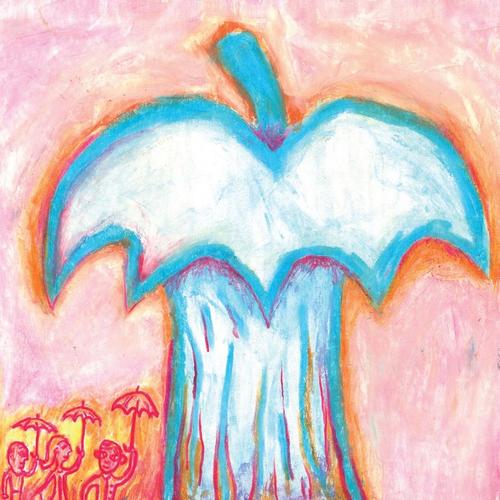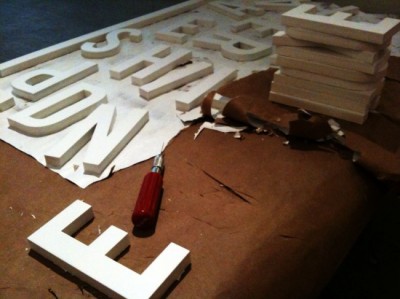Delehanty describes the CPS as a kind of intellectual support group. “For me, a lot of artists are just learning to be an artist within the art school community, and it’s a little bubble. But then you leave school and the bubble bursts, and artists feel alienated, and don’t know how to make art without the dialogue. So this school greatly fills that need,” he explained. “I paid so much money to go to art school, and you’re just paying for the facilities and to be within a kind of art colony. … this gives me the opportunity to talk about more intellectual things. I got that when I went to gallery openings and bars, but it’s different to have a space where you can go once a week, and meet fellow artists and movers and shakers, and learn from their success.”
To date, the Co-Prosperity School has successfully completed four semesters. Marszewski says that each week, a different Chicago art world “hero or villain” (speakers have included Jim Elkins and Hamza Walker) makes a presentation, followed by a discussion that can last long into the night. Although the courses are relatively open and free-format, according to Delehanty the emphasis has tended to be on the working artist’s concerns. Conversations have centered on topics like tips for building resumés, and how to use tools like Google docs.
As for the participants, “Most of the people already have their MFAs and are working artists,” Delehanty explained. “They’re almost all exhibiting work in the city; or sometimes gallery owners come who are trying to understand the artist’s lifestyle a little better. Curators and writers come, and even some artists who just have their BFAs, but they’re all very active. A current BFA student wouldn’t feel too comfortable here. There’s a lot of career advice; whatever you need to work on in your career, there can be a class dedicated to it.”
Another artist-run pedagogical endeavor that was launched last year was Brandon Alvendia’s HomeSchool, run out of his recently opened Storefront project space. Matt Austin, who is currently heading up a music-based educational project called “The Mountain was a Gift” through the HomeSchool program, told F Newsmagazine that he was introduced to the concept “through the conversations I was having with Brandon about our teaching methods. He teaches in the Art and Design Department at Columbia College, and I have taught photography programs at Jones College Prep, and now teach at Senn High. We each shared the desire to provide avenues for our students’ learning that doesn’t channel their responses into a quick one of boredom or interest. We were also interested in providing pedagogical situations that remove some of the distance between the student and teacher dynamic.”
Alvendia further expounded on HomeSchool’s mission, telling F Newsmagazine that the program is “trying to promote a culture of experimental and independent knowledge-building. The focus of the initiative is experiential and process-oriented programming and research. The School includes all subjects and teaching approaches free by accepting any and all course proposals, and offering publicly accessible venues,” he explained. And in order to help break down traditional academic hierarchies, “all participants are invited to take on the title ‘Director of Education.’ But more importantly, HomeSchool encourages a deeper development of substantive social-ties through critical self-learning, beyond mere reading, writing and ‘rithmetic (student loans),” said Alvendia.
Austin has already taken The Mountain was a Gift on the road with his co-collaborators Jeff Austin (Matt’s brother) and EJ Hill, and he told F that both he and Alvendia look forward to expanding the ambulatory potential of the HomeSchool program through a Road Trip artist residency. “But I would say that most importantly, we’re looking for people who are interested in educating in an unorthodox way, and hope in helping with the planning, providing the spaces, and spreading the word out to develop a sizable student body,” he concluded.
The Educational Turn
These projects could all be described as part of a broader trend called “the educational turn,” a term coined by theorist Irit Rogoff. The idea references the emphasis on talking, discourse, and sharing knowledge in horizontal, non-hierarchical ways that has come to characterize cultural production today. These free school initiatives, as well as free online knowledge-sharing platforms like wikipedia and aaaarg.org, could all be read as symptoms of this trend.
But on a more practical level, participants and organizers of local artist-run education endeavors all agree that these projects are not about providing an alternative to tuition-based, degree-granting programs. Instead, they’re more focused on building community and filling a need for a structured exchange of ideas — at least, for now. If the education bubble does indeed burst, it is not unthinkable that pressure would be put on these systems to politicize and present a truly viable alternative format for sharing knowledge.
Could we be looking at a future free of obligatory degrees from accredited universities? Anyone grappling with $800-per-month student loan payments may be tempted to hope so.







